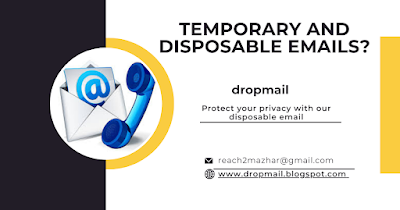Introduction
In a world where our inboxes are constantly bombarded with messages, protecting your digital space has never been more important. Enter temporary and disposable email services—the clever tools helping users avoid spam, maintain privacy, and manage online clutter. From signing up for one-time offers to safeguarding your identity, these services are gaining popularity. But how secure are they really? How much email traffic are we dealing with daily? And why are more people turning to temp mail? Let’s explore.
What Are
Temporary and Disposable Emails?
Temporary or disposable emails are short-term email addresses that work like regular ones but are designed to vanish after a certain period—typically from a few minutes to a couple of days. They’re perfect for quick tasks and don’t require any personal details. Popular tools like DropMail, 10MinuteMail, and Guerrilla Mail make it easy to create these addresses instantly.
🖼️ Image Suggestion: Side-by-side comparison of a temporary email dashboard vs. a standard email inbox.
Why Use Temp Mail? 7 Practical Scenarios
-
Keep Spam at Bay
Use temp mail when subscribing to newsletters, downloading free resources, or joining new sites—your main inbox stays clean. -
Stay Anonymous
Avoid exposing your personal email during transactions or interactions on untrusted platforms. -
Test Email Campaigns
Great for developers and marketers who need to test features without crowding their official inbox. -
Skip Forced Registrations
Access online resources, Wi-Fi, or downloads without giving up your personal details. -
Investigate Safely
Not sure about a link? Use a disposable address to open it with minimal risk. -
Organize Your Projects
Create separate emails for specific tasks or clients to streamline communication. -
Maintain Privacy Online
Join forums or fill surveys without attaching your identity to it.
🖼️ Image Suggestion: A visual flowchart showing how temp mail acts as a spam filter.
Are Temp Emails Safe? Pros and Cons
✅ Advantages:
-
Protects your primary email from exposure and spam.
-
Doesn’t require registration or personal info.
-
Quick and easy to generate.
❌ Disadvantages:
-
Emails disappear after a set time—risk of losing important messages.
-
Limited features; no storage or multi-factor authentication.
-
Not suitable for personal or sensitive transactions like banking.
Bottom Line:
Temporary emails are safe when used for casual or low-risk purposes but shouldn't be used for critical communications.
🖼️ Image Suggestion: A lock icon (representing privacy) beside an hourglass (indicating short lifespan).
Just How Many Emails Are Sent Every Minute?
As per recent data from Statista, over 347 billion emails were sent daily in 2023—that’s about 241 million emails per minute! Nearly half of this volume is spam. This overwhelming flood is a major reason temp mail services are gaining popularity—they act as a buffer against irrelevant content.
🖼️ Image Suggestion: An infographic with global email statistics visualized per minute.
What Is Email Used For Today? Beyond Messaging
Though temp mail is ideal for short-term use, traditional email remains essential for:
-
Business and professional communication
-
Email marketing campaigns
-
Sharing official documents
-
Password recovery and authentication
Disposable email services complement traditional use by handling more temporary or high-risk activities.
Temp Mail vs. Regular Email: A Side-by-Side View
| Feature | Temp Mail | Regular Email |
|---|---|---|
| Lifespan | Minutes to days | Permanent |
| Privacy | High (no identity tied) | Linked to personal data |
| Storage | Usually none | Large storage (e.g., Gmail) |
| Purpose | Quick, anonymous tasks | Long-term communication |
Smart Tips for Using Disposable Email
-
Choose services with longer expiration if waiting for a confirmation email.
-
Avoid using it for confidential information.
-
Use with a VPN for maximum anonymity.
-
Stick to trusted services like DropMail or Guerrilla Mail.
Frequently Asked Questions
Q: Can I get back a temp mail once it’s gone?
A: No. Once expired, the inbox is permanently deleted.
Q: Do disposable email providers track or store data?
A: Most reputable services auto-delete emails. Still, always check the platform’s privacy policy.
Q: Is it legal to use temp email addresses?
A: Yes, they’re legal. However, some websites may restrict or block them.
Conclusion
Temporary and disposable email addresses are a smart, modern solution to digital overload and privacy risks. While they’re not built for everything, using them wisely can help you stay safe, organized, and spam-free. So the next time you’re asked for an email on a sketchy site—go disposable. It might be your best digital defense.


0 Comments